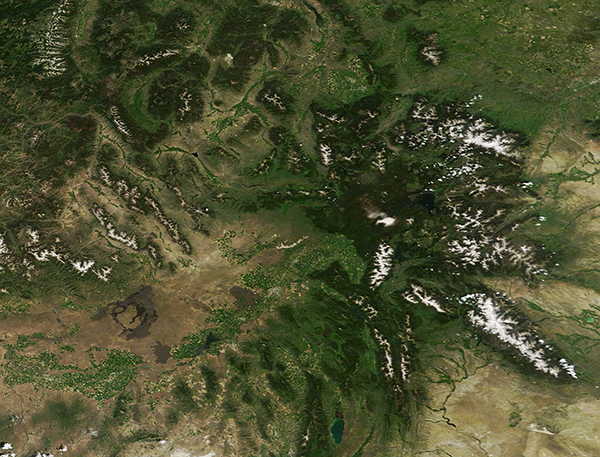Images
July 4, 2023 - Craters of the Moon and Grand Tetons
Tweet
On July 2, 2023, the Moderate Resolution Imaging Spectroradiometer (MODIS) on NASA’s Terra satellite acquired a true-color image of a sunny summer day in a beautiful section of the Western United States.
The image is centered close to the spot where Montana (north), Idaho (southwest), and Wyoming (southeast) meet. This spot is just northwest of a patch of fog, which appears bright white. The fog (also known as “low cloud”) is located in Wyoming, just north of the snow-capped Grand Teton and south of Yellowstone National Park.
Perhaps the most unusual sight is a large crescent-shaped patch of black and brown that spills over the Snake River Plain in Idaho. Known as the Craters of the Moon, this is the largest young basaltic lava field in the coterminous United States.
The Craters of the Moon and other nearby lava flows were created thousands of years ago as lava poured out of the Great Rift, a volcanic zone of cracks in the Earth’s crust that runs approximately 62 miles from the northwest corner of the Snake River Plain to the southeast. The Great Rift was not violently explosive; rather, it quietly laid down thick blankets of molten rock. The Craters of the Moon is made up of over 60 different lava flows, the most recent of which is about 2,100 years old, and the oldest of which is 15,000 years old.
A second large basaltic lava flow can be seen tucked up against the mountains east of the Craters of the Moon. This is known as Hell’s Half-Acre Lava Field, and it sits less than 20 miles from the city of Idaho Falls, Idaho. The city appears as a swath of gray pixels along the Snake River.
Image Facts
Satellite:
Terra
Date Acquired: 7/2/2023
Resolutions:
1km (515.3 KB), 500m (1.3 MB), 250m (2.9 MB)
Bands Used: 1,4,3
Image Credit:
MODIS Land Rapid Response Team, NASA GSFC
Tweet
On July 2, 2023, the Moderate Resolution Imaging Spectroradiometer (MODIS) on NASA’s Terra satellite acquired a true-color image of a sunny summer day in a beautiful section of the Western United States.
The image is centered close to the spot where Montana (north), Idaho (southwest), and Wyoming (southeast) meet. This spot is just northwest of a patch of fog, which appears bright white. The fog (also known as “low cloud”) is located in Wyoming, just north of the snow-capped Grand Teton and south of Yellowstone National Park.
Perhaps the most unusual sight is a large crescent-shaped patch of black and brown that spills over the Snake River Plain in Idaho. Known as the Craters of the Moon, this is the largest young basaltic lava field in the coterminous United States.
The Craters of the Moon and other nearby lava flows were created thousands of years ago as lava poured out of the Great Rift, a volcanic zone of cracks in the Earth’s crust that runs approximately 62 miles from the northwest corner of the Snake River Plain to the southeast. The Great Rift was not violently explosive; rather, it quietly laid down thick blankets of molten rock. The Craters of the Moon is made up of over 60 different lava flows, the most recent of which is about 2,100 years old, and the oldest of which is 15,000 years old.
A second large basaltic lava flow can be seen tucked up against the mountains east of the Craters of the Moon. This is known as Hell’s Half-Acre Lava Field, and it sits less than 20 miles from the city of Idaho Falls, Idaho. The city appears as a swath of gray pixels along the Snake River.
Image Facts
Satellite:
Terra
Date Acquired: 7/2/2023
Resolutions:
1km (515.3 KB), 500m (1.3 MB), 250m (2.9 MB)
Bands Used: 1,4,3
Image Credit:
MODIS Land Rapid Response Team, NASA GSFC




